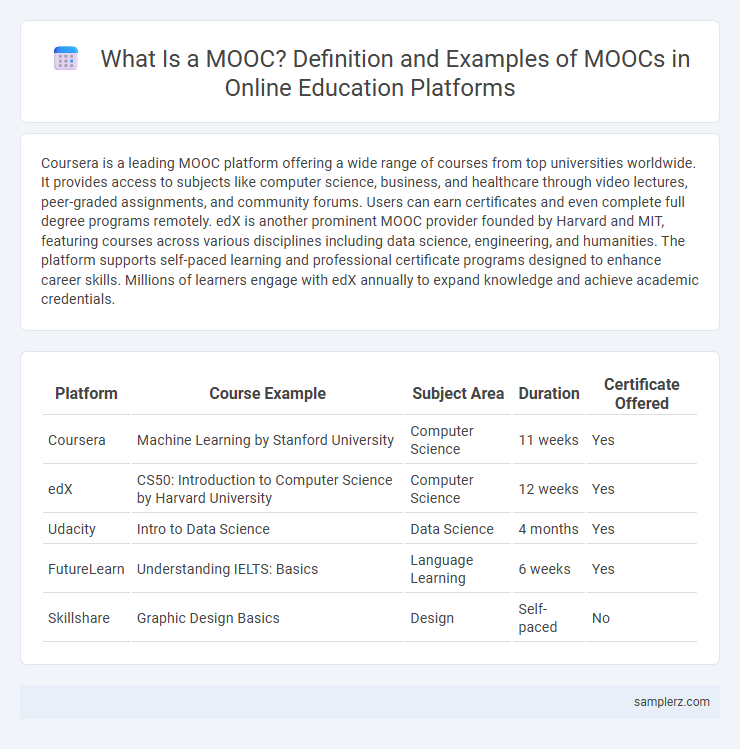Coursera is a leading MOOC platform offering a wide range of courses from top universities worldwide. It provides access to subjects like computer science, business, and healthcare through video lectures, peer-graded assignments, and community forums. Users can earn certificates and even complete full degree programs remotely. edX is another prominent MOOC provider founded by Harvard and MIT, featuring courses across various disciplines including data science, engineering, and humanities. The platform supports self-paced learning and professional certificate programs designed to enhance career skills. Millions of learners engage with edX annually to expand knowledge and achieve academic credentials.
Table of Comparison
| Platform | Course Example | Subject Area | Duration | Certificate Offered |
|---|---|---|---|---|
| Coursera | Machine Learning by Stanford University | Computer Science | 11 weeks | Yes |
| edX | CS50: Introduction to Computer Science by Harvard University | Computer Science | 12 weeks | Yes |
| Udacity | Intro to Data Science | Data Science | 4 months | Yes |
| FutureLearn | Understanding IELTS: Basics | Language Learning | 6 weeks | Yes |
| Skillshare | Graphic Design Basics | Design | Self-paced | No |
Introduction to MOOCs in Modern Education
Massive Open Online Courses (MOOCs) like Coursera's "Introduction to Learning Analytics" provide accessible, scalable education to millions worldwide, revolutionizing traditional learning models. These courses leverage video lectures, interactive quizzes, and peer forums to enhance student engagement and flexible learning. Platforms such as edX and Udacity also contribute to the MOOC ecosystem by offering diverse subjects from top universities, integrating technology with pedagogy to democratize education globally.
Key Features of Leading MOOC Platforms
Coursera offers a vast array of courses from top universities, featuring flexible deadlines and verified certificates to enhance learner credentials. edX provides high-quality content with professional certificate programs and micro-degrees designed in collaboration with industry leaders. Udacity specializes in project-based learning and nanodegree programs, emphasizing real-world skills and mentorship from industry experts.
Coursera: Pioneering Global Online Courses
Coursera offers a diverse range of MOOCs covering fields such as computer science, business, and healthcare, partnering with over 200 top universities worldwide including Stanford and Yale. The platform has enrolled millions of learners globally, providing flexible access to accredited certifications and degree programs. Coursera's innovative use of video lectures, peer-graded assignments, and interactive quizzes enhances learner engagement and knowledge retention.
edX: Flexible Learning from Top Universities
edX offers flexible learning opportunities through massive open online courses (MOOCs) developed by top universities such as Harvard and MIT. Its platform provides a wide range of subjects, from computer science to humanities, enabling learners worldwide to access high-quality education at their own pace. edX's verified certificates and MicroMasters programs enhance career prospects by demonstrating mastery in specialized fields.
Udacity: Career-Focused Nanodegree Programs
Udacity offers Career-Focused Nanodegree Programs that provide industry-relevant skills in fields like data science, artificial intelligence, and programming. These Nanodegree programs incorporate real-world projects and mentorship from experts, enhancing job readiness for learners worldwide. Through partnerships with leading tech companies, Udacity ensures curriculum alignment with current market demands.
FutureLearn: Social Learning with Accredited Institutions
FutureLearn offers MOOCs developed by accredited universities and institutions, emphasizing social learning through interactive discussion forums and peer collaboration. The platform provides courses on diverse subjects such as healthcare, business, and technology, enabling learners to earn certificates recognized by official educational bodies. FutureLearn's structure supports flexible, learner-centered education, fostering engagement and real-time knowledge exchange within global learning communities.
Khan Academy: Free Educational Resources for All Ages
Khan Academy offers a vast array of free educational resources spanning subjects like math, science, and humanities, catering to learners from elementary school to college level. The platform provides interactive exercises, instructional videos, and personalized learning dashboards, enhancing student engagement and comprehension. Trusted by millions worldwide, Khan Academy exemplifies accessible MOOC-style education that supports self-paced study and mastery of complex topics.
Diversity of Subjects Offered on MOOC Platforms
Coursera offers a vast array of courses spanning computer science, business, arts, and personal development, showcasing the diversity of subjects available on MOOC platforms. edX features programs from top universities covering engineering, humanities, health, and data science, catering to a wide spectrum of learners. Platforms like Udacity emphasize technology and professional skills, while FutureLearn provides courses in literature, psychology, and social sciences, highlighting the interdisciplinary nature of online education.
Impact of MOOCs on Access to Quality Education
Coursera, a leading MOOC platform, offers over 4,000 courses from top universities like Stanford and Yale, democratizing access to high-quality education worldwide. MOOCs reduce barriers by providing affordable, flexible learning opportunities to millions, especially in underserved regions lacking traditional educational resources. This widespread accessibility enhances skill development and lifelong learning, contributing significantly to global educational equity.
Choosing the Right MOOC for Your Learning Goals
Coursera offers a wide range of MOOCs tailored to various learning goals, including professional development and personal enrichment. Platforms like edX provide courses from top universities with flexible schedules, allowing learners to select programs that align with their career aspirations. Evaluating course content, instructor credentials, and learner reviews helps ensure the chosen MOOC effectively meets specific educational objectives.

example of MOOC in online platform Infographic
 samplerz.com
samplerz.com